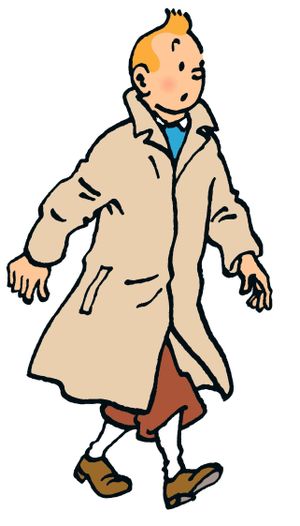The Tintin Within
(Image courtesy © Hergé-Moulinsart 2010)
Deep in the heart of almost any child, there hides a secret wish to, at least on occasion, be an orphan. Free of all parental control, rudderless, able to decide what one will eat, where one will go and how one will live. Disney knew this. Most contemporary Middle Reader authors know this. They cater to any child’s hidden desire to be independent with protagonists who live like miniature adults, with all the benefits and none of the prosaic worries of mortgages, grocery bills and taxes.
I don’t know how old I was when I first encountered Tintin, probably 10 or 12 years old. The books I remember reading must have been something my grandfather had around the house. His appetite for reading material was boundless and he was always bringing home something new and occasionally exotic from the cavernous bookstore downtown. I remember the comic books were big - like a magazine - and like nothing I’d seen before. And neither was Tintin. This was not Archie, Veronica and Jughead.
I grew up on a steady diet of Nancy Drew mysteries. Not the namby pamby 1950s Nancy Drew who was as stiff as a tulle petticoat. I preferred the older versions of the novel. Where Nancy sped along in her roadster, chasing after the bad guys with the wind in her hair. Or, the 1970s Nancy - my contemporary - who had nascent feminist spunk. Nancy wasn’t exactly an orphan, but she was close because she had only her father, a busy judge, to answer to. And everyone knows you can get away with more with your father. Mothers see everything. They ask too many questions. They look at you and through you and manage to pull information out of your brain without you even knowing it. What young detective or journalist needs that kind of interference?
Tintin, the hero of a long-running Belgian comic strip, was all contradiction. His creator, Herge, once said that when he was a boy it seemed to him that journalists had freedom, that they were the ones who had all the adventures. Considering the time when Herge was growing up - post WWI and pre-WWII Belgium - it’s no surprise the freedom to come and go as you pleased, freedom from privation and occupation, was the ultimate fantasy. So, when he created his boy adventurer, Herge made him a journalist. But true to form, he didn’t encumber his boy with real-world entanglements. Tintin was just 16-years-old but he had no parents. He was a reporter but had no editor. No deadlines. No photographer. No paper or magazine. He had a dog, a trusty sidekick, but his dog was a fluffy terrier, not the fierce hound you might imagine. He lived alone. He could fly a plane. He could battle the bad guys. His best friend was a drunken captain.
Nancy Drew was smart and gutsy and willing to head out on an adventure. But she was tethered, and her best friends were two girls named Bess and George (What was with George, anyway?) And nobody was ever drunk.
The Belgians love their comics. (There is an entire museum in Brussels devoted to Belgian comics.) Herge’s gift was bringing to life - through the imagination of the reader - the swashbuckling life of Tintin one frame, one clifhanger adventure, at a time. Tintin was a multigenerational hero. Children, especially boys, grew up to be adults who still followed his adventures one carefully inked frame at a time.
I was in Brussels at the time and attended a premier showing of Steven Spielberg’s new movie, The Adventures of Tintin: The Secret of the Unicorn. The city, still in the throes of European Union economic crisis meetings, was in a Tintin party mood and the theater was packed. After the credits rolled, I asked a couple of Belgians what they thought. They admitted they liked it but each had the same comment: Too much action. In Spielberg’s hands their beloved comic strip character, the lead actor in movies that had, until now, played only in their own heads--has gone Hollywood.
I brought home a few Tintin books and watched my daughter read them. And when she asked for more I bought the only copies on the shelf at the local bookstore. We’ll be at the theater when the movie opens here. Most of those around us won’t have any prior experience with the young Belgian who traveled the world, sleeping on trains and hopping behind the stick of a float plane when he wasn’t riding camels or blasting off in rockets. But that won’t matter. Because deep within each of us, young or old, there will be a flicker of recognition.
Cheryl-Anne Millsap is a freelance writer based in Spokane. Her essays can be heard on Spokane Public Radio and on public radio stations across the country. She is the author of “Home Planet: A Life in Four Seasons” and can be reached at catmillsap@gmail.com
